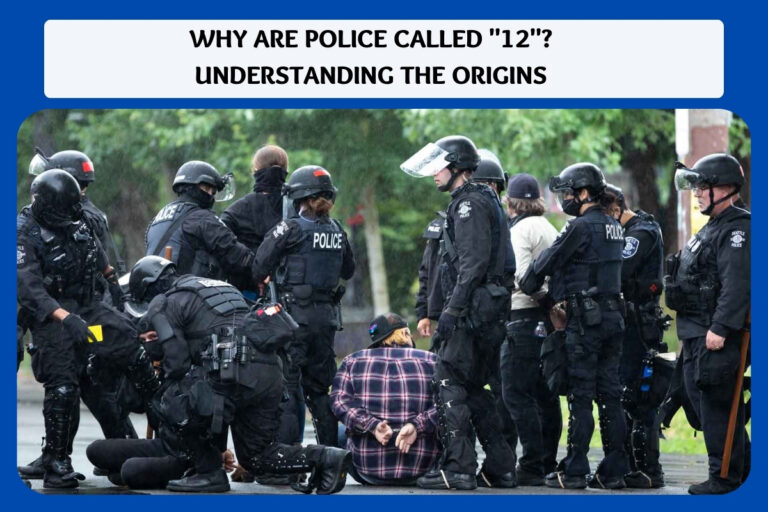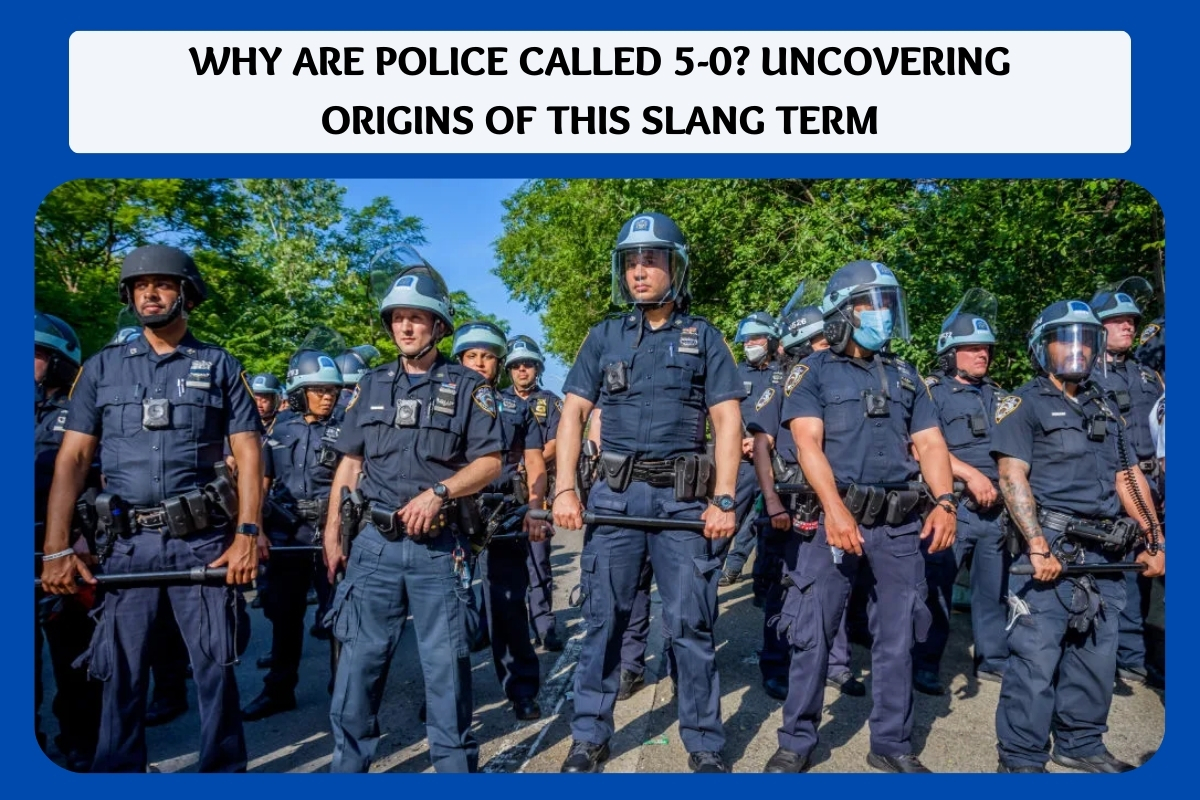Have you ever wondered why the police are sometimes referred to as "12"? This intriguing term has deep historical roots and cultural significance. The phrase "12" as a reference to law enforcement is not just a random number but carries a rich backstory tied to policing practices and societal norms. Understanding this terminology can provide valuable insights into the evolution of modern policing and its relationship with communities.
Throughout history, language has played a crucial role in shaping public perception of authority figures, including police officers. In this article, we will explore the origins of the term "12" and how it became synonymous with law enforcement. By examining historical documents, cultural references, and expert analysis, we aim to shed light on this fascinating topic.
This article is designed to be informative and accessible, providing readers with a comprehensive understanding of the term's origins and its relevance today. Whether you're a history enthusiast, a student of criminal justice, or simply curious about the language of law enforcement, this guide will answer your questions and deepen your knowledge.
- Movierulz 2023 Kannada The Ultimate Guide For Film Enthusiasts
- Stay Updated With Movierulz Kannada Movies Latest Releases News 20242025
- Filmyfly 2025 Latest Movies Streaming News Watch Now And Stay Updated
- Fikfap The Ultimate Guide To Understanding This Viral Phenomenon
- Hikaru Nagi Sone 436 Unveiling Her Life And Career
Table of Contents
- The Origin of the Term "12"
- Historical Context of Policing
- Cultural References in Media
- Evolution of Law Enforcement Practices
- Public Perception of the Term
- Modern Usage and Relevance
- Subheading: The Role of Slang in Policing
- Subheading: Legal Implications of Terminology
- Subheading: Community Relations and Language
- Subheading: Future of Policing Terminology
The Origin of the Term "12"
The term "12" as a reference to police officers dates back to the early days of modern policing in the United States. Historians believe that the number "12" originated from the practice of police officers working 12-hour shifts during the late 19th and early 20th centuries. At that time, law enforcement agencies adopted a rotating shift system to ensure continuous coverage of urban areas experiencing rapid growth and industrialization.
Another theory suggests that the term "12" may have originated from the use of call boxes by police officers. In many cities, officers were required to check in with central stations every hour, using a system of 12 hourly checks to confirm their presence and activity. This system helped supervisors monitor officer accountability and response times, reinforcing the association between the number "12" and police work.
Historical Context of Policing
To fully understand why the police are called "12," it's essential to examine the broader historical context of policing in the United States. The development of professional police forces began in the mid-19th century, as urbanization and immigration led to increased demand for public safety services. Early police departments faced numerous challenges, including limited resources, corruption, and strained community relations.
- Bratty G Baby On Tiktok And Onlyfans What You Need To Know
- Filmyflynet Hollywood Your Ultimate Guide To Streaming Hollywood Movies
- Latest On Ullu Web Series Free Content And More Unveiled
- Ullu Telugu Web Series Movierulz The Ultimate Guide For Fans
- Watch Bollywood Hollywood Movies On Bollyflixpet Ndash Your Ultimate Streaming Guide
Subheading: The Role of Slang in Policing
Slang terms like "12" have long been part of the language used by both law enforcement officers and the general public. These terms often reflect the cultural and social dynamics between police and the communities they serve. For example, slang can serve as a shorthand for complex ideas or as a way to build camaraderie among officers. However, it can also create barriers to communication and understanding if not used carefully.
Cultural References in Media
Popular culture has played a significant role in spreading the term "12" to a wider audience. Movies, television shows, and music frequently use slang terms for police as a way to add authenticity or humor to their narratives. For instance, hip-hop and rap music often reference "12" in lyrics, reflecting the experiences and perspectives of urban communities.
- Classic films like Die Hard feature characters using slang terms for police.
- Television series such as The Wire and Southland incorporate authentic language used by officers and civilians alike.
- Music artists like N.W.A. and Tupac Shakur popularized the term "12" in their songs, highlighting issues of police brutality and systemic injustice.
Evolution of Law Enforcement Practices
Over the years, law enforcement practices have evolved significantly, influenced by technological advancements, policy changes, and societal demands. The use of terms like "12" has adapted alongside these changes, reflecting shifts in public perception and officer-community interactions. Today, many police departments emphasize transparency, accountability, and community engagement as core principles of modern policing.
Subheading: Legal Implications of Terminology
While slang terms like "12" may seem innocuous, they can have legal implications in certain contexts. For example, the use of derogatory or offensive language to describe law enforcement officers can lead to charges of obstruction or disorderly conduct. Conversely, officers must also be mindful of their own language, as inappropriate or discriminatory terms can undermine trust and professionalism.
Public Perception of the Term
Public perception of the term "12" varies widely depending on factors such as geographic location, demographic background, and personal experiences with law enforcement. In some communities, the term may evoke feelings of safety and protection, while in others, it may be associated with fear or mistrust. Understanding these perceptions is critical for fostering positive relationships between police and the communities they serve.
Subheading: Community Relations and Language
Language plays a vital role in shaping community relations, particularly in the context of law enforcement. By using respectful and inclusive language, officers can build trust and rapport with diverse populations. Conversely, the misuse or overuse of slang terms like "12" can create misunderstandings or alienate certain groups. Training programs focused on communication skills and cultural competence can help bridge these gaps.
Modern Usage and Relevance
In contemporary society, the term "12" continues to be used in various contexts, from casual conversations to formal discussions about policing. Social media platforms have further amplified its reach, allowing users to share opinions and experiences related to law enforcement. As debates around police reform and accountability intensify, understanding the language of policing becomes increasingly important.
Subheading: Future of Policing Terminology
Looking ahead, the future of policing terminology will likely be shaped by ongoing discussions about equity, justice, and community engagement. As society evolves, so too must the language we use to describe law enforcement and its role in our lives. By embracing inclusive and respectful terminology, we can work toward a more harmonious and equitable future.
Key Statistics and Expert Insights
According to a report by the Bureau of Justice Statistics, there are approximately 700,000 sworn law enforcement officers in the United States. These officers serve in a variety of capacities, from patrol duties to specialized investigations. Studies show that effective communication and language use are critical factors in building trust between police and the communities they serve.
Experts in criminal justice emphasize the importance of education and training in addressing language barriers and promoting mutual understanding. Programs like community policing initiatives and cultural sensitivity training have shown promise in improving officer-community relations.
Conclusion
In conclusion, the term "12" as a reference to police officers has a rich history rooted in the evolution of modern policing practices. By exploring its origins, cultural significance, and modern usage, we gain a deeper appreciation for the language of law enforcement and its impact on society. As we move forward, it is essential to prioritize respectful and inclusive communication to strengthen relationships between police and the communities they serve.
We invite you to share your thoughts and experiences in the comments below. Are there other terms or phrases related to policing that interest you? Let us know, and don't forget to explore our other articles for more insights into this fascinating field!
Related Resources:
- Hikaru Nagi Sone 436 Latest News Updates Released Nov 12 2024
- Bolly4u Guide To Bollywood Movies Streaming And More News
- Discover Bolly4uhub Your Essential Gateway To Bollywood Movies Online
- The Ultimate Guide To Xxmx Enhance Your Knowledge And Skills
- Prmovies In Your Ultimate Destination For Movie Entertainment



Detail Author:
- Name : Isaac Fisher
- Username : manderson
- Email : kovacek.kamryn@cole.com
- Birthdate : 1976-02-19
- Address : 67438 Bernita Divide Apt. 192 North Oceane, MI 74979
- Phone : +1.908.328.9304
- Company : Franecki-Marquardt
- Job : Eligibility Interviewer
- Bio : Aspernatur ut enim voluptatem quae non. Aut et occaecati sit commodi ab sed. Id quod quis recusandae laboriosam explicabo.
Socials
linkedin:
- url : https://linkedin.com/in/lorenzo5884
- username : lorenzo5884
- bio : Occaecati excepturi veniam aut ut sed.
- followers : 5993
- following : 2898
instagram:
- url : https://instagram.com/kunzel
- username : kunzel
- bio : Qui vel omnis consequatur. Odio aliquid fugiat nemo saepe. Ipsa unde facere sequi ut.
- followers : 6539
- following : 2679
facebook:
- url : https://facebook.com/lorenzo_kunze
- username : lorenzo_kunze
- bio : Neque accusamus ut maxime nam eligendi aliquam.
- followers : 3897
- following : 1829
twitter:
- url : https://twitter.com/lorenzo_id
- username : lorenzo_id
- bio : Non molestias ut qui. Saepe itaque qui consequatur optio tempora rerum deleniti. Ab sed quas aut et.
- followers : 5424
- following : 1649
tiktok:
- url : https://tiktok.com/@kunze1988
- username : kunze1988
- bio : Enim explicabo sit numquam. Provident est nulla aut.
- followers : 4303
- following : 482